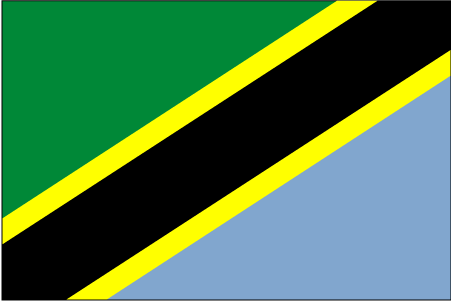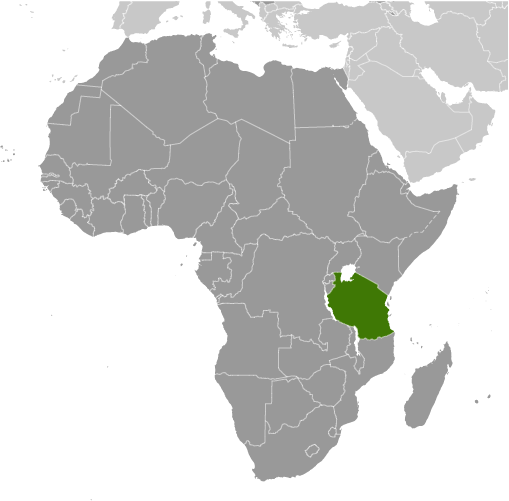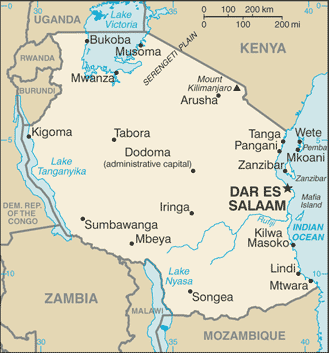Shortly after achieving independence from Britain in the early 1960s, Tanganyika and Zanzibar merged to form the nation of Tanzania in 1964. One-party rule came to an end in 1995 with the first democratic elections held in the country since the 1970s. Zanzibar's semi-autonomous status and popular opposition have led to two contentious elections since 1995, which the ruling party won despite international observers' claims of voting irregularities.
Population
41,892,895
Country comparison to the world:30
note:estimates for this country explicitly take into account the effects of excess mortality due to AIDS; this can result in lower life expectancy, higher infant mortality, higher death rates, lower population growth rates, and changes in the distribution of population by age and sex than would otherwise be expected (July 2010 est.)
Nationality
Noun:Tanzanian(s)
Adjective:Tanzanian
Ethnic groups
mainland - African 99% (of which 95% are Bantu consisting of more than 130 tribes), other 1% (consisting of Asian, European, and Arab); Zanzibar - Arab, African, mixed Arab and African
Religions
mainland - Christian 30%, Muslim 35%, indigenous beliefs 35%; Zanzibar - more than 99% Muslim
Languages
Kiswahili or Swahili (official), Kiunguja (name for Swahili in Zanzibar), English (official, primary language of commerce, administration, and higher education), Arabic (widely spoken in Zanzibar), many local languages
note: Kiswahili (Swahili) is the mother tongue of the Bantu people living in Zanzibar and nearby coastal Tanzania; although Kiswahili is Bantu in structure and origin, its vocabulary draws on a variety of sources including Arabic and English; it has become the lingua franca of central and eastern Africa; the first language of most people is one of the local languages
Country Name
Conventional long form:United Republic of Tanzania
Conventional short form:Tanzania
Local long form:Jamhuri ya Muungano wa Tanzania
Local short form: Tanzania
Former:United Republic of Tanganyika and Zanzibar
Government Type
republic
Capital
Name:Dar es Salaam
Geographic coordinates: 6 48 S, 39 17 E
Time difference: UTC+3 (8 hours ahead of Washington, DC during Standard Time)
note: legislative offices have been transferred to Dodoma, which is planned as the new national capital; the National Assembly now meets there on a regular basis
Administrative divisions
26 regions; Arusha, Dar es Salaam, Dodoma, Iringa, Kagera, Kigoma, Kilimanjaro, Lindi, Manyara, Mara, Mbeya, Morogoro, Mtwara, Mwanza, Pemba North, Pemba South, Pwani, Rukwa, Ruvuma, Shinyanga, Singida, Tabora, Tanga, Zanzibar Central/South, Zanzibar North, Zanzibar Urban/West
Independence
26 April 1964; Tanganyika became independent 9 December 1961 (from UK-administered UN trusteeship); Zanzibar became independent 19 December 1963 (from UK); Tanganyika united with Zanzibar 26 April 1964 to form the United Republic of Tanganyika and Zanzibar; renamed United Republic of Tanzania 29 October 1964
National Holiday
Union Day (Tanganyika and Zanzibar), 26 April (1964)
Constitution
25 April 1977; major revisions October 1984
Legal system
based on English common law; judicial review of legislative acts limited to matters of interpretation; has not accepted compulsory ICJ jurisdiction
Suffrage
18 years of age; universal
Executive branch
Chief of state: President Jakaya KIKWETE (since 21 December 2005); Vice President Dr. Ali Mohammed SHEIN (since 5 July 2001); note - the president is both chief of state and head of government
Head of government:President Jakaya KIKWETE (since 21 December 2005); Vice President Dr. Ali Mohammed SHEIN (since 5 July 2001)
note: Zanzibar elects a president who is head of government for matters internal to Zanzibar; Amani Abeid KARUME reelected to that office on 30 October 2005
Cabinet:Cabinet appointed by the president from among the members of the National Assembly
(For more information visit the World Leaders website)
Elections:president and vice president elected on the same ballot by popular vote for five-year terms (eligible for a second term); election last held on 14 December 2005 (next to be held in October 2010); prime minister appointed by the president
Election results:Jakaya KIKWETE elected president; percent of vote - Jakaya KIKWETE 80.3%, Ibrahim LIPUMBA 11.7%, Freeman MBOWE 5.9%
Legislative branch
unicameral National Assembly or Bunge (274 seats; 232 members elected by popular vote, 37 allocated to women nominated by the president, 5 to members of the Zanzibar House of Representatives; members serve five-year terms); note - in addition to enacting laws that apply to the entire United Republic of Tanzania, the Assembly enacts laws that apply only to the mainland; Zanzibar has its own House of Representatives to make laws especially for Zanzibar (the Zanzibar House of Representatives has 50 seats; members elected by universal suffrage to serve five-year terms)
Elections:last held on 14 December 2005 (next to be held in October 2010)
Election results:National Assembly - percent of vote by party - NA; seats by party - CCM 206, CUF 19, CHADEMA 5, other 2, women appointed by the president 37, Zanzibar representatives 5 Zanzibar House of Representatives - percent of vote by party - NA; seats by party - CCM 30, CUF 19; 1 seat was nullified with a rerun to take place soon
Judicial branch
Permanent Commission of Enquiry (official ombudsman); Court of Appeal (consists of a chief justice and four judges); High Court (consists of a Jaji Kiongozi and 29 judges appointed by the president; holds regular sessions in all regions); District Courts; Primary Courts (limited jurisdiction and appeals can be made to the higher courts)
Political Parties and Leaders
Chama Cha Demokrasia na Maendeleo (Party of Democracy and Development) or CHADEMA [Bob MAKANI]; Chama Cha Mapinduzi or CCM (Revolutionary Party) [Jakaya Mrisho KIKWETE]; Civic United Front or CUF [Ibrahim LIPUMBA]; Democratic Party [Christopher MTIKLA] (unregistered); Tanzania Labor Party or TLP [Augustine Lyatonga MREME]; United Democratic Party or UDP [John CHEYO]
Political pressure groups and leaders
Economic and Social Research Foundation or ESRF; Free Zanzibar; Tanzania Media Women's Association or TAMWA
International organization participation
ACP, AfDB, AU, C, EAC, EADB, FAO, G-6, G-77, IAEA, IBRD, ICAO, ICC, ICCt, ICRM, IDA, IFAD, IFC, IFRCS, ILO, IMF, IMO, IMSO, Interpol, IOC, IOM, IPU, ISO, ITSO, ITU, ITUC, MIGA, NAM, OPCW, SADC, UN, UNAMID, UNCTAD, UNESCO, UNHCR, UNIDO, UNIFIL, UNMIS, UNOCI, UNWTO, UPU, WCO, WFTU, WHO, WIPO, WMO, WTO
Diplomatic representation in the US
Chief of mission: Ambassador Ombeni Yohana SEFUE
Chancery:2139 R Street NW, Washington, DC 20008
Telephone:[1] (202) 939-6125
FAX:[1] (202) 797-7408
Diplomatic representation from the US
Chief of mission:Ambassador Alfonso LENHARDT
Embassy:686 Old Bagamoyo Road, Msasani, Dar es Salaam
Mailing address: P. O. Box 9123, Dar es Salaam
Telephone: [255] (22) 266-8001
FAX: [255] (22) 266-8238, 266-8373
Flag description
divided diagonally by a yellow-edged black band from the lower hoist-side corner; the upper triangle (hoist side) is green and the lower triangle is blue; the banner combines colors found on the flags of Tanganyika and Zanzibar; green represents the natural vegetation of the country, gold its rich mineral deposits, black the native Swahili people, and blue the country's many lakes and rivers, as well as the Indian Ocean










